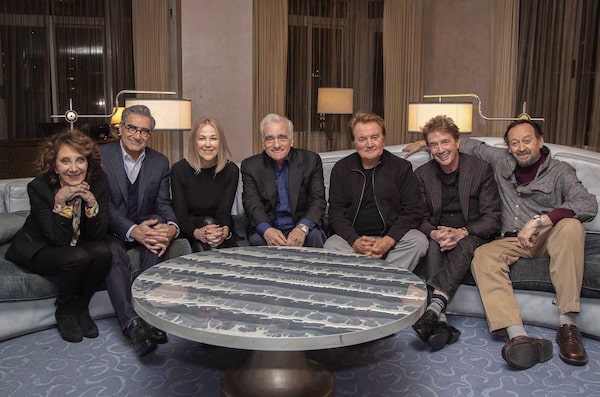
Director Martin Scorsese, center, with the cast of SCTV from left: Andrea Martin, Eugene Levy, Catherine O'Hara, Dave Thomas, Martin Short and Joe Flaherty.HO/The Canadian Press
That comedy attracts miserable, persecuted people is, by now, conventional wisdom cum cliché.
Crack any book about the history of humour and one’s bound to trip over long-recycled theories about why certain minority groups turn to humour to ease their suffering or similar hypotheses about how the maladjusted and the outcast find similar solace. My own research, as the author of such a book, has narrowed toward similar conclusions. Not only do the exiled, the misunderstood and the straight-up churlish tend to turn to comedy, but comedy itself tends to thrive through conflict: through the petty jealousies and combativeness that drive performers into a state of productive one-upmanship, with the single-minded drive to be funnier (or the funniest) serving as the rising tide that, as the saying goes, lifts all ships.
Comedy is suffering. Comedy is bloodshed. Comedy is the nasty stuff of life turned inside-out, transmuted to ease the very unpleasantness from which it proceeds.
The exception, it seems, is SCTV. It was a lesson made abundantly clear at Sunday’s cast reunion at Toronto’s lavish Elgin Theatre. Filmed as part of an upcoming Netflix-produced, Martin Scorsese-directed, career-spanning retrospective, a recurring theme of the extended onstage conversation was that the Second City Television Network wasn’t about conflict or trifling competitiveness. It was (as hopelessly lame as it sounds) about friendship and good old-fashioned camaraderie.
Without divulging spoilers or surprises – though it is impossible to determine what will eventually end up in Scorsese’s final Netflix cut – the nearly three-hour event focused on moderator Jimmy Kimmel’s keenness to bait the surviving SCTV cast members (Joe Flaherty, Eugene Levy, Andrea Martin, Rick Moranis, Catherine O’Hara, Martin Short and Dave Thomas) into laying bare the warts-and-all, behind-the-scenes secrets of their cult-classic comedy show. Nobody took the bait.
Instead, the audience was treated to stories of a group of ragtag improvisational comics encouraging and enabling each other to be as funny as possible. They’d punch up each other’s sketches, write characters for one another and generally take pains to spread the love. “We also didn’t know anybody was watching,” joked Moranis. “That made all the difference.”
This isn’t to say that the troupe played into a different set of stock clichés about Canadian comedy being polite and genteel. Indeed, as Kimmel put it, SCTV was “vicious in a very Canadian way.” SCTV’s riffs on soap operas, TV news, K-tel-styled infomercials, and rink-a-dink quiz shows cut the vacuity and hollowness of the expanding network-TV landscape in the late 1970s and 80s. SCTV’s wildly talented cast of writers and players were cool without being desperate enough to want to appear cool.
Likewise, while Sunday’s sold-out, big-ticket reunion taping was a genial-enough affair, it was not lacking in left turns and genuinely hilarious anecdotes. Stories about the late John Candy provided extra depth and dimension to a comic and actor whose hagiography too often presents him as some angelic, irrepressibly lovable lug.
Naturally, a high-profile reunion like this is bound to teeter into self-mythologizing and arch pretentiousness. And the prospects of the actual, completed Scorsese doc remain to be seen (the film will premiere at a yet-to-be-determined date on Netflix across the globe, with the exception of Canada, where it will premiere on CTV before becoming available on the streaming service). Then again, that Scorsese is one of the greatest artists that America has produced (and a long-time SCTV fan) bodes well. When the diminutive director, freshly returned from Cannes, tottered across the stage at the Elgin during the reunion’s closing moments, the crowd erupted into spontaneous applause.
Yet the more encouraging ovation was for Moranis, a late addition to the reunion who all but retired from comedy and acting in 1997 to focus on raising his children following the loss of his wife Ann in the early nineties. It was a sign that this SCTV reunion (far from the troupe’s first) was serious enough business to draw Moranis out of semi-reclusion. And better yet, Moranis was quick-witted, funny, dishing out anecdotes and impressions like he’d never stepped out of the game.
More than the announcement of a legacy-certifying Scorsese doc, Moranis’s mere presence spoke to that spirit of kinship and fellow-feeling that’s so often absent from legacy comedy troupes or rock bands or other cultural institutions. After 40-plus years, SCTV’s surviving cast cannot only tolerate each other. They genuinely seem to enjoy one another’s company.
Sure, some comedy proceeds from suffering. But some of the best of it, it seems, comes from something as silly as love. Or, at least, from the genuine energy that’s produced when like-minded, deeply funny people get on a stage together.